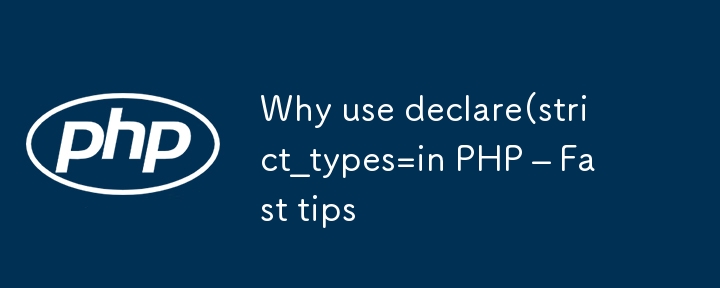

In this tutorial, we'll explore what declare(strict_types=1) means, why PHP developers should use it and why not, and provide examples to illustrate its importance.
This setting comes because of the loosely typed nature of PHP and the increasing demand of strictly typed features led by other popular languages like Java.
Both typing strategies (loose vs strict) have pros and cons, first of all let's understand their meaning.
A loosely typed language, also known as a dynamically typed language, is a programming language where variables are not bound to a specific data type at compile-time. You don't need to declare in advance what data type a variable will contain during the execution.
The data type of a variable is determined based on the value it holds and can change at runtime.
PHP is basically a loosely typed language, so we can write an example with it:
$a = "hello"; $a = 1; // No errors. The content of the variable is changed from string to int.
Loosely typed languages often allow for implicit type conversion, meaning they may automatically convert data from one type to another to facilitate operations. This behavior can lead to more flexibility but also a higher potential for functional errors.
A strictly typed language, also known as a statically typed language, is a programming language where variables must be explicitly declared with a specific data type at compile-time.
Once a variable's data type is defined, it cannot change during its lifetime. Strictly typed languages do not perform implicit type conversion, meaning operations between variables of different types typically result in a compilation error.
We can write an example in Java:
public class CompileError { public static void main(String[] args) { int x = 15; x = "Valerio"; } }
declare(strict_types=1) is a directive in PHP that enforces strict type checking for function and method arguments and return values within a specific PHP file or code block. When you enable strict type checking, PHP ensures that the data types of function arguments and return values match exactly with the declared types. Exactly the same way as Java does.
Place this declaration at the very beginning of your PHP file or code block (before any other code) to enable strict typing.
Here's the basic syntax to enable strict type checking:
Copy after login
Enforcing strict typing can significantly improve your code's reliability in certain scenarios.
Strict typing helps prevent unexpected type-related issues that can lead to runtime errors or incorrect behavior. It ensures that you’re always working with the data types you expect.
For example, consider a function that is supposed to add two numbers:
function add($a, $b) { return $a + $b; } $result = add(5, '10'); // Without strict typing, this is allowed. echo $result; // Output: 15
Without strict types, PHP would coerce the string '10' to an integer and produce a result that might not be what you intended.
With declare(strict_types=1):
declare(strict_types=1); function add(int $a, int $b) { return $a + $b; } $result = add(5, '10'); // Fatal error: Uncaught TypeError
With strict types enabled, PHP throws a TypeError and prevents the function from running, ensuring type safety.
Continue to the original article --> https://inspector.dev/why-use-declarestrict_types1-in-php-fast-tips/
The above is the detailed content of Why use declare(strict_types=in PHP – Fast tips. For more information, please follow other related articles on the PHP Chinese website!




